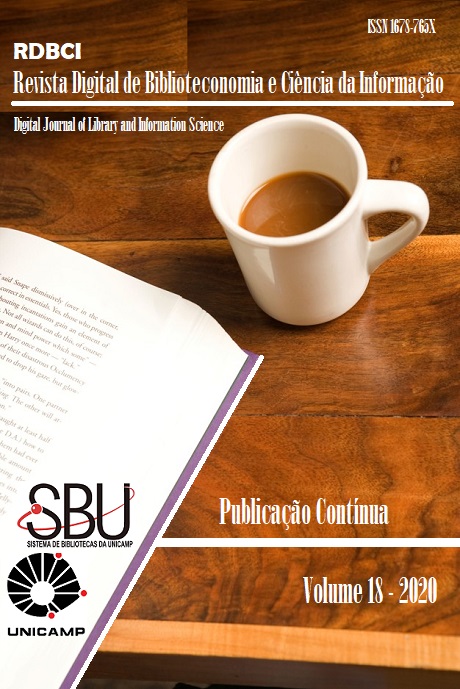Abstract
Librarianship and Information Science are two fields that have intrinsic relation between each other, mainly in Brazil. However, in spite of the convergences, these areas arose in different historical periods and with objectives to meet very specific demands. Currently, it is noticed that Librarianship is more focused on issues related to social responsibility and democratization of education, while Information Science focuses its efforts on research in order to understand information as a phenomenon in different contexts. Among these, this article is interesting, in the strategic and professional information, usually within organizations. Between these two approaches is the university library, which occupies a prominent role in the area of education as well as strategic planning of a country. Therefore, the purpose of this article is to analyze the contributions of the two fields for the management of university libraries today. Through the literature review, it is concluded that the two areas provide complementary inputs that allow the managers of these units to create an environment and services that meet the needs of their users in a more satisfactorily way. Librarianship brings both technical and humanistic contributions to university libraries, while Information Science contributes to issues related to the instability of today's society, which demands constant redefinition of the services provided.
References
ARAÚJO, Carlos Alberto Ávila. A ciência da informação como ciência social. Ciência da Informação, Brasília, DF, v. 32, n. 3, p. 21-27, set./dez. 2003. Disponível em: http://www.scielo.br/pdf/ci/v32n3/19020.pdf. Acesso em: 26 fev. 2020.
ARAÚJO, Carlos Alberto Ávila. Arquivologia, Biblioteconomia, Museologia e Ciência da Informação. São Paulo: Briquet de Lemos, 2014.
BAUMAN, Zygmunt. Modernidade líquida. Rio de Janeiro: J. Zahar, 2001.
BORKO, Harold. Ciência da Informação: o que é isso? 1968. (Tradução livre). Disponível em: https://bit.ly/2WGPHW2. Acesso em: 26 fev. 2020.
CAPURRO, Rafael. Epistemologia e Ciência da Informação. [2009?]. Disponível em:
http://www.capurro.de/enancib_p.htm. Acesso em: 26 fev. 2020.
CARDOSO, Ana Maria Cardoso. Pós-modernidade e informação: conceitos complementares? Perspectivas em Ciência da Informação, Belo Horizonte, v. 1, n. 1, p. 63-79, jan./jun.1996. Disponível em: http://portaldeperiodicos.eci.ufmg.br/index.php/pci/article/view/241. Acesso em: 26 fev. 2020.
DIAS, Eduardo José Wense. Biblioteconomia e Ciência da Informação: natureza e relações. Perspectivas em Ciência da Informação, Belo Horizonte, v. 5, n. especial., p. 67-80, jan./jun. 2000. Disponível em: portaldeperiodicos.eci.ufmg.br/index.php/pci/article/download/556/338. Acesso em: 26 fev. 2020.
FONSECA, Edson Nery da. Introdução a biblioteconomia. 2. ed. Brasília, DF: Briquet de Lemos, 2007.
LE COADIC, Yves-François. A ciência da informação. 2.ed. Brasília, DF: Briquet de Lemos, 2004.
MARTELETO, Regina Maria. A pesquisa em Ciência da Informação no Brasil: marcos institucionais, cenários e perspectivas. Perspectivas em Ciência da Informação, Belo Horizonte, v. 14, número especial, p. 19-40, 2009. Disponível em: http://www.scielo.br/pdf/pci/v14nspe/a03v14nspe.pdf. Acesso em: 26 fev. 2020.
MARTINS, Wilson. A palavra escrita: história do livro, da imprensa e da biblioteca. 3. ed. rev. atual. São Paulo: Ática, 1998.
ORTEGA, Cristina Dotta. Relações históricas entre Biblioteconomia, Documentação e Ciência da Informação. DataGramaZero - Revista de Ciência da Informação, João Pessoa, v. 5, n. 5, out. 2004. Disponível em: https://bit.ly/3dPxKKS. Acesso em: 26 fev. 2020.
PINHEIRO, Lena Vania Ribeiro; LOUREIRO, José Mauro Matheus. Traçados e limites da ciência da informação. Ciência da Informação, Brasília, DF, v. 24, n. 1, p. 52-61, maio/ago. 1995. Disponível em: http://revista.ibict.br/ciinf/article/view/609/611. Acesso em: 26 fev. 2020.
SILVA, Jonathas Luiz Carvalho. Fundamentos da informação I: perspectivas em ciência da informação. São Paulo: ABECIN, 2017. 263p. Disponível em: http://www.repositoriobib.ufc.br/000042/00004231.pdf. Acesso em: 26 fev. 2020.
SHUMAKER, David. The embedded librarian: innovative strategies for taking knowledge where its needed. Medford: Information Today, 2012.
TARAPANOFF, Kira Maria Antonia. O profissional da informação e a sociedade do conhecimento: desafios e oportunidades. Transinformação, Campinas, v. 11, n. 1, p. 27-38, 1999. Disponível em: http://www.brapci.inf.br/index.php/article/download/14966. Acesso em: 26 fev. 2020.
TEDESCO, Juan Carlos. Educar na sociedade do conhecimento. Araraquara: Junqueira e Marin, 2006.

This work is licensed under a Creative Commons Attribution 4.0 International License.
Copyright (c) 2020 Fernanda Vasconcelos Amaral, Elisa Cristina Delfini Corrêa






